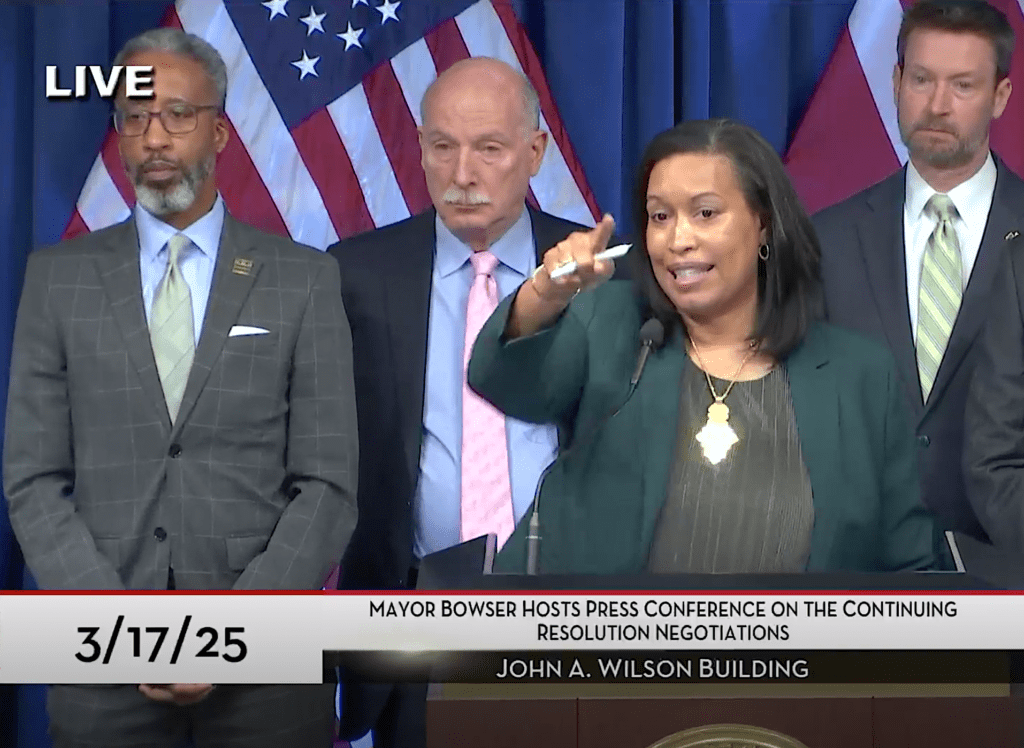$1-Billion D.C. Budget Cutback Clawed Back by Bowser
By • March 17, 2025 0 1152

It was just a week ago March 10 when the usually calm Mayor of Washington, D.C., Muriel Bowser sounded a stunning alarm. “D.C. will lose $ 1.1 billion of our budgeted funds if the continuing resolution (CR) passed by Congress to fund the government until Sept. 30 is passed by the Senate. That means devastating cuts from funds for schools, for police and for economic growth!”
“We are now suddenly focused on our survival,” the mayor proclaimed. “And it’s all a big mistake … Legislators didn’t include language that is normally present in all and stop gap bills in the past clarifying that Washington, D.C., is a distinct entity. It is not an executive agency of the federal government funded by and run by the feds.”
“We are a city, county, state all at once,” Bowser said. “We raise our own money through taxes and charges. None of the $1 billion that Congress wants to take out of our budget is federal money. It won’t reduce the federal deficit one bit. It’s local money, raised and allocated locally. Yet if the CR’s language is not changed, D.C. will have six months to cut spending by $1.1 billion.”
The House passed the bill on March 11. Hundreds of D.C. advocates, including groups of school children, spent hours on Capitol Hill talking to legislators to fix the language and restore the cuts to D.C.’s local budget. Some called it a Hobson’s choice. Either the government would not pass a budget by midnight on March 14 and be partially shut down — meaning that tens of thousands of government workers might be furloughed and designated officially as “nonessential workers.”
As in the past, it was expected that once the shutdown impasse was negotiated, those furloughed would return to their jobs with back pay fully restored. Usually the party blamed for the shut down — often the cut-government Republicans — would be blamed and suffer politically for the decision.
But the political environment is different this year. The Trump administration has mounted an aggressive campaign to cut government waste and bloat that most Americans support in theory. It also seemed likely that this time Democrats would be blamed for all negative outcomes of a shutdown.
The other option was to pass the bill as it is, with no government shutdown but allowing Trump to further cut federal agencies budgets under the executive branch’s jurisdiction.
After days of tension, the Senate minority leader Chuck Schumer (D-N.Y.) decided to vote for the CR as less damaging to the party overall and persuaded eight Democrats to go along — enough to overcome a filibuster. On Saturday, the Senate sent the CR to the House where it had the votes to pass and be sent to the president to sign.
Except for the matter of D.C.
A number of bipartisan Senators led by Republican Susan Collins of Maine and Democrat Chris Van Holland of Maryland managed to write and pass a stand-alone bill that would clearly designate D.C. as its own entity and not a federal agency, echoing the language of the left-out provision.
The measure passed the Senate on Friday and now has to be voted on and passed by the House after it returns on Monday, March 17. President Trump and Republican members of the House Appropriations Committee have already voiced their approval of it.
In a press conference on March 17, Mayor Bowser acknowledged that it still wasn’t a done deal. When asked if she had a contingency plan in case the special provision didn’t pass the House, she answered, “We’re working on it now.”
The mayor explained that the D.C. budget, which has been approved, focused on public safety, public education and economic growth. She also said “to make Washington, D.C., the best, most beautiful city in the world is a goal I share with Donald Trump.”
Several news reports concluded, however: “The drama over funding the government is technically over until September, though Washington is still sifting through the aftermath.”

